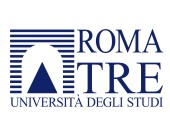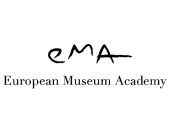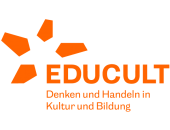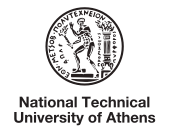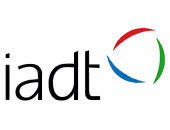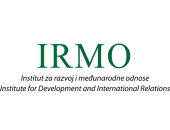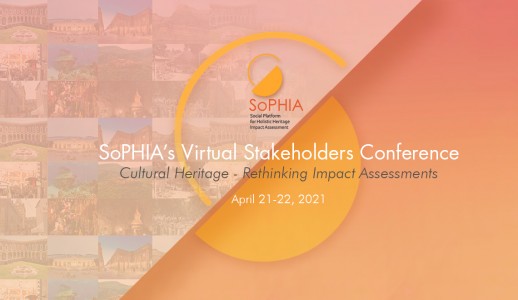
Cultural Heritage – Rethinking Impact Assessments (April 21-22, 2021)
SoPHIA – Social Platform for Holistic Heritage Impact Assessment – , an EU research and innovation Horizon 2020 funded project, reviewed the literature, policy programmes and practices and mapped existing gaps, issues and problems. After consultations during the first Workshop with members of the Social Platform, a draft model was designed. The draft model has been tested in twelve case studies across Europe.
Against this background, SoPHIA invites researchers, practitioners, policymakers from Europe and beyond and anyone interested to a collective reflection on the diverse impact of cultural heritage during the two days SoPHIA´s Stakeholder Virtual Conference.
The first day will broach pressing issues of cultural heritage. Those issues have proven to be relevant to the cases of cultural heritage interventions analysed in the project. Representatives from the cases and invited guest will discuss with the audience main challenges and opportunities that have been encountered, in parallel panels from 10:30 until 12:00 and from 13:00 until 14:30, including:
- bridging the gap between culture and sustainability;
- access and inclusion in public spaces and in cultural heritage education;
- opportunities and challenges of evaluation requirements;
- dissonant European cultural heritage;
- over-tourism in urban environments.
Based on the discussions, the programme of the second day will focus on the findings of the SoPHIA case studies and the debate on the cultural heritage draft model for impact assessment will be spurred. A virtual World Café will allow Conference participants to provide feedback and input on issues that relate the concrete findings and the discussions of the first Conference day.
AGENDA. Download it for updates.
Wednesday, April 21st 2021
| 9:30 – 9:45 | Welcome |
| 9:45 – 10:30 |
Keynote Conversation
|
| 10:30 – 12:00 |
Panel 1: Bridging the Gap between Culture and Sustainability This session will explore the impact of the culture sector on the environment and analyse the role cultural institutions and initiatives are playing for a sustainable future.
Moderation: Caitlin Southwick | Ki Culture
|
| 10:30 – 12:00 |
Panel 2: Education and Cultural Heritage This session will discuss the extent to which education is seen as a fundamental part of the work in heritage. It also asks what challenges the field faces, and how the impact of education on cultural heritage can be measured.
Moderation: Nathaniel Prottas | Wien Museum, Austria |
| 10:30 – 12:00 |
Panel 3: Public Spaces and Cultural Heritage This session will focus on larger cultural areas and how to assess social capital, and access to these areas. The stakeholders and target groups are usually very broad, which also makes it important to ask how negotiation processes can be initiated, the response to different demands, and the inclusion of varying perspectives in impact assessments.
Moderation: Theresa Schütz | Architect, Art in Public Space |
| 12:00 – 12:45 |
Break & Virtual Networking Lounge |
| 12:45 – 13:00 |
Artistic Intervention by Elif Duygu | poetry slam artist |
| 13:00 – 14:30 |
Panel 4: Assessing European Capitals of Culture ECOC standards of evaluation and monitoring, defined by the European Union, are sophisticated in nature, with no comparable principles of assessment in cultural programs. The panel in this ses-sion will broach the opportunities and challenges of these unique assessments, through discussions with representatives from various former and upcoming ECOCs.
Moderation: Beatriz Garcia | University of Liverpool |
| 13:00 – 14:30 |
Panel 5: Placing Dissonant Heritage within European Cultural Heritage Narratives In the recent past, a growing emphasis of EU cultural policy on cultural heritage has been witnessed. This session will explore how Europe’s dissonant past is placed within its cultural heritage narratives, and what step can be taken to facilitate Europe’s relationship with its uncomfortable history.
Moderation: Erminia Sciacchitano | Cabinet of the Italian Minister of Cultural Heritage |
| 13:00 – 14:30 |
Panel 6: Over-tourism and the City This session aims to deconstruct the phenomenon of over-tourism and its impact on the urban fabric and its heritage value(s). Panelists will also discuss strategies to deal with urban centres affected by the rising traffic of tourists.
Moderation: Evinc Dogan | Bogazici University, Turkey |
| 14:30 – 14:45 | Break & Virtual Networking Lounge |
| 14:45 – 16:00 | Closing Session |
| 16:00 – 17:00 |
Guided online tour through …
|
Thursday, April 22nd 2021
| 10:00 – 10:15 | Welcome |
| 10:15 – 11:15 |
1st and 2nd round of the World Café (opportunity of rotating participation in 2 stations - 30 min. per station) |
The question of climate change, usage of resources and green economy in cultural heritage interventions is an overarching concern with regards to its ecological, economic, social and cultural aspects. In view of a holistic model for cultural heritage interventions, this issue must be analysed in further detail. Potential ways, mechanisms, and implication of the sustainable usage of resources for cultural heritage sites/interventions will be discussed. |
|
The social capital of cultural heritage strongly depends on who has access and how access is enabled via educational activities, knowledge transfer, and partnerships across disciplines, policies and communities. Challenges and opportunities for cultural heritage in ensuring diversity in social capital and knowledge will be discussed. |
|
SoPHIA research has shown that the location and reachability (via public transport, barrier-free access, etc.) of urban cultural heritage sites/interventions is an important prerequisite for the attractiveness of cultural heritage and it’s potential with regard to the quality of life. Challenges in terms of location, de-centralization, reachability and attractiveness to various target groups will be discussed in order to define this area of impact in more detail. |
|
Continuous and longitudinal monitoring and assessment has many advantages for the management of cultural heritage as well as for ensuring participation and a multi-stakeholder perspective. The ECOC examples, however, also show how challenging it is to ensure such an approach of assessment. Furthermore, a mul-ti-stakeholder perspective and longitudinal approach in assessing cultural herit-age also depend on the resources available. The possibilities and mechanisms of how such approaches can be ensured despite these challenges will be explored. |
|
The narratives projected and told through cultural heritage contribute to identity building, a sense of belonging and community. However, the importance of giving room to different, potentially conflictual narratives from various communities has been underlined often, including in the SoPHIA case studies. Ways of grasping a variety of narratives, communicating and reflecting them through cultural heritage will be discussed in order to define this area of impact in more detail. |
|
The economic and social impact of cultural heritage interventions often appear to be in conflict with one another. A specific example is the tension between the touristic profitability of cultural heritage and the disadvantages stemming from tourism. In order to grasp this potential dichotomy, the dangers and advantages of economic development for social issues will be discussed, to define this area of impact in more detail. |
|
| 11:15 – 11:30 | Break & Virtual Networking Lounge |
| 11:30 – 12:30 |
3rd and 4th round of the World Café (opportunity of rotating participation in 2 stations - 30 min. per station) |
| 12:30 – 13:00 | Closing Session |

